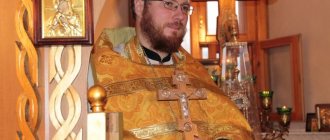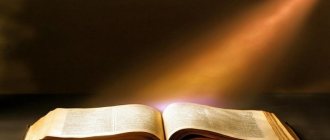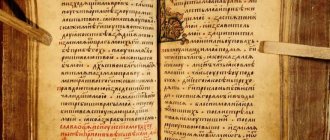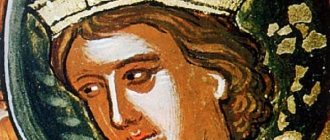History of writing
The second psalm is considered messianic, that is, containing prophecies about Christ. In the Hebrew, Greek and Latin Bibles this psalm is not spelled with the name of David, but in the Slavic tradition it exists. However, in the book of the Acts of the Apostles, Peter quotes the psalm in response to the persecution of Christian believers by priests ruled by Herod and Pontius Pilate. At the same time, the Apostle Peter noted that this is what the servant of God, Father David, says.
Attention! We recommend that you read a prayer for money to Spyridon of Trimifuntsky, which can be done on this page.
Building on the promise of Psalm 2, Peter talks about the protection of Jesus Christ for those who have strong faith. Scholars imply that the writing of this psalm dates back to the time when God's ark had already been transported to Zion.
In the opening verses of Psalm 2, King David wonders how princes and kings can rebel against their Creator.
From verses 1 to 4, David , fighting in endless wars, knows that the Lord is next to him, calls all wars against the Almighty senseless. They will provoke the wrath and laughter of the Lord. That is, all attempts to overthrow the Lord’s Anointed will end in their desecration and ridicule. No one managed to overthrow David, who enlisted the support of the Lord himself.
Verse 7 tells us that the Lord God begat His Son. King David considers himself one. Also in the verse we find lines that the Messiah was originally with God, from the very creation of the world.
Verses 8-9 contain a powerful promise from the Creator. Christians can ask him for everything, most importantly for good and with pure faith. All enemies and problems will be destroyed by the rod and will disappear like fragments of an earthen vessel.
The Lord gives King David the right to rule the earth, holding an iron rod in his hands, and all his enemies will become like clay vessels that he can easily defeat.
Verses 10-11 are an appeal to kings in authority. They serve the Creator with fear and trembling.
Uses [edit]
Judaism[edit]
Verse 1 is recited during Selichot. [14]
This psalm is also read to relieve headaches when caught in a sea storm. [15]
New Testament [edit]
Some verses of Psalm 2 are mentioned in the New Testament:
- Verses 1-2: in Acts 4:25-26. [16]
- Verse 7: in Acts 13:33; Hebrews 1:5; Hebrews 5:5. [16]
- Verses 8-9: in Revelation 2: 26,27; 12:5; 19:15. [16]
Catholic Church[edit]
According to the rule of St. Benedict (530 AD), Psalms 1 to 20 were largely reserved for the office of the First. This psalm was chosen by St. Benedict of Nursia on Monday as Prime Minister; in the rule of St. Benedict 530, it was read or sung between Psalm 1 and Psalm 6. [17]
In the Liturgy of the Hours, Psalm 2 is sung or read in the Chapel of the Hours of the first week [18] along with Psalm 1 and Psalm 3. Every Tuesday, Opus Dei faithful recite Psalm 2 in Latin after invoking their guardian angel and kissing the rosary. [19]
Book of Common Prayer[edit]
In the Book of Common Prayer
For the Anglican Church, Psalm 2 is prescribed to be read on the morning of the first day of the month. [20]
Why is Psalm 2 read?
There are no strict rules for reading Psalm 2. Although some believe that it should be read by high-ranking people, for example, prime ministers, deputies, directors, and the president. That is, those who are endowed with certain powers, authority and are responsible for people. Then this applied to kings, today to presidents and all people who have a high position and a certain power.
Be that as it may, the habit of reading the psalms of King David changes a person’s thinking, filling it with:
- strong faith;
- the desire to send prayers to the Lord;
- the desire to do good to people;
- a sense of security and confidence in the future.
Interpretation of Psalm 8
- Verses 1-2: David conveys all his admiration for God in song. The Lord sees everything, and not a single piece of earth is hidden from his eyes. It is he who gives a person vital energy and strength. God's glory rises above the mountains and seas.
- Verses 3-4: God's glory does not require scientists, historians, or rulers. You just need to trust the creator and help will come. Under the protection of the Creator, even a baby is strong. It is impossible to understand with reason all the miraculous power of the Lord. Praise be to the Creator! David thanks him for his great deeds and help.
- Verses 5-9: The author draws a parallel between people and the Lord. Only gratitude and humility will lead to grace. David ends the text with words of gratitude to the Almighty.
Psalm 2: Interpretation and Explanation
As you already understand, psalms are different. There are psalms of repentance, joy, thanksgiving, and there is a special section of psalms - “messianic”. The Messiah is one of the key concepts of sacred scripture and sacred history. Translated from Hebrew it means “anointing” and in Greek it sounds like “Christ”. By the way, in Hebrew the word “messiah” sounds like “Mashiach”. The fact is that the Greeks do not have the letter “Sh” in their dictionary, and where the Jew said “Sh”, the Greek pronounced “S”. So “Moshe” became “Moses”, and “Shlomo” became “Solomon”.
Scripture speaks about the Messiah for the first time when it talks about the Fall. The Lord God put it between the serpent, who drew the wife and her husband into sin, and between the wife. From the seed of the woman, the Lord promised the coming into the world of a redeemer who would erase the head of the serpent.
To this day, the main difference between Jews and Christians is that we believe in the Messiah who has already come, while the Jews are still waiting for him. This is the main theme of all Jewish history. Passionate anticipation of the coming of the Redeemer and a passionate desire to bring this hour closer.
Psalm 2 speaks of the Messiah as having already come. The psalm says that the princes of the earth and kings, glorious people, gathered together to overthrow the divine law.
Christ calls his commandments and teachings a good yoke. It is this yoke that people who have been separated from their knowledge for several centuries have been trying to throw off. Thus, a person with a fever tears off his bandages and plasters. This situation is understandable from within the life we live. People have been trying to erase from themselves the last signs of belonging to faith for several centuries. It is human nature to be proud of what is above him. Thus, a Hindu is proud of the Vedas, and a Muslim is proud of the Haran. Only former Christians, civilized and educated, are proud not of Christ and his Gospel, but of actresses and athletes, travelers and scientists. At the table of the world the Lord was given the last place, as the last beggar.
In the psalm, the Lord God is depicted as laughing, and he knows very well that those who are at enmity against him are at enmity against themselves. Ivan Andreevich Krylov has a wonderful fable about how people began to be at enmity with the sky. They collected a bunch of deadly metal, stones, darts, arrows and began to fiercely and furiously throw it all upward. The ending is predictable. The weapon fell on the heads of the madmen. This happens to everyone who is at enmity against God.
The psalm promises wrathful retribution. Moreover, the Son – the Anointed One, the Messiah – will be angry and punish. In the second psalm, Christ does not appear in the image in which we are accustomed to looking at him in the Gospel. If there he is meek and merciful, then in Psalm 2 he looks more like himself from the apocalypse. He is formidable and great, and in his hands is a rod with which he crushes nations like clay pots.
“Glorify your son so that he does not become angry, honor your son,” says the psalm. And these words equally apply to both Jews who do not believe in Christ and former Christians whose lifestyle has turned away from the sun.
Publication by the successors of A.P. Lopukhin. Explanatory Bible. Interpretation of the Psalter
| SEARCH | FORUM |
Psalm 2
Psalm of David
In the Hebrew, Greek and Latin Bibles this psalm does not have the name of David in its inscription; The inscription of this name existing in the Russian Bible is confirmed by the testimony of Prince. Acts (IV:25), where Ap. Peter, quoting the words of verses 1 and 2 of this psalm, calls them the words of God spoken “by the mouth of our father David thy servant.”
In 1-4 tbsp. the failure of the enemy's attack on God's anointed is predicted. The reason for this failure is the great protection of him from God and the promise that the power of this anointed one will spread even throughout the whole world (5-9), therefore his present reign over holy Zion (6) will be unshakable. The holiness of Mount Zion depends on the presence of God on it, a visible sign of which is the presence of the Icon of the Covenant on it. Therefore, one can think that the psalm was written after David brought the ark from Kariath-jearim to Zion.
David's reign was a time of constant war. The most powerful uprising against him was the uprising of the united forces of the Syrians and Ammonites. One might think that the rebellion against David of the nations depicted in the psalm took place during his war with the Syro-Ammonites. The main content of the psalm is devoted to the disclosure of the promise that was given by God to David about his future all-world power over the world. Such a promise, as can be seen from historical books (2 Samuel VII: 12-16), was given to David through the prophet Nathan about his Descendant, whose kingdom would be eternal. From all that has been said, we can conclude that this psalm was written after the transfer of the Icon to Zion regarding the promise given to David about a Descendant during the war with the Syrian-Ammonites.
In the first part of the psalm (1-9), David expresses bewilderment and regret that the kings of the earth rebelled against God and His anointed, when such a rebellion by its very essence cannot end in success, like the revolt of the weak against the strong (1-5). The authority of the anointed one will remain unshakable, since he received from God the promise not only to be king over Zion, but also over the whole world (6-9). Therefore, it would be more prudent for kings if, instead of fighting with God and His son, they submitted to Him, so as not to incur complete destruction from the Lord (10-12).
1 Why do nations rage, and nations plot vain things? 2 The kings of the earth rise up, and the rulers take counsel together against the Lord and against His Anointed.
1-2. “They are restless” - they are worried, “they are plotting in vain” - they are plotting the impossible; “kings” are the highest rulers of the state, “princes” are military leaders. By the Anointed One, David could mean himself, since he received power over the Jewish people from God through the anointing of them by the prophet Samuel.
3 “Let us break their bonds, and cast off their fetters from us.”
3. “Break the bonds” and “overthrow the fetters” clarify the purpose of the uprising. David's power increased to a high degree. To put an end to his further development, the neighboring pagan peoples who remained independent aroused the tribes he had already conquered against David and united with them in order to jointly break his spreading power. Such was the uprising of the Ammonites (Kings X: 6-13), who incited against David and the Syrians (X: 6-7), who had previously been conquered by David (2 Kings VIII: 5-6).
4 He who dwells in heaven will laugh; the Lord will mock him. 5 Then He will say to them in His anger and dismay them with His fury:
4-5. “He who lives in heaven” - by the will of the Lord and with His direct help to David, this enterprise of the enemies, instead of glory, will bring them reproach and ridicule, that is, it will end in failure, which really happened and should have happened, since the enemies entered into a fight with God, the patron of David, an omnipotent being.
6 “I have anointed My King over Zion, My holy mountain;
6. David does not contrast the unshakable strength of his throne with the success of the enterprise of his enemies; the latter “willfully” rebelled against him, but David was “anointed” by the Lord. The enemies must perish, since David received such a promise from God: “Thou art my Son: today have I begotten thee.” In connection with the speech and in relation to the historical position of David in the fight against the Syro-Ammonites, this promise can be understood as David’s expectation of help from God in this particular case, since he is the son of God, that is, he is under His special protection, and naturally that the father protects the son born to him (7).
7 I will declare the decree: The Lord said to Me: You are My Son; Today I have given birth to You; 8 Ask of Me, and I will give the nations for Your inheritance, and the ends of the earth for Your possession; 9 You will strike them with a rod of iron; You will break them in pieces like a potter’s vessel.”
8-9. David is promised by God the expansion of power over the whole earth (8), but his enemies will be as powerless before him as clay vessels are weak before an iron rod. “Rod” is a staff, as a necessary accessory for shepherds. They passed the sheep under the staff to count, and the staff in their hands served as a sign of their power over the flocks. The “iron” staff serves as an image of the indestructibility of this power. Since the psalm was written about the uprising of David’s enemies, then by contrition here we must mean the death of those who rise up against him.
10 Therefore, understand, O kings; learn, judges of the earth! 11 Serve the Lord with fear and rejoice [before Him] with trembling. 12 Honor the Son, lest He be angry, and lest you perish in your journey, for His anger will soon kindle. Blessed are all who trust in Him.
10-12. The enemies of David, the “judges of the earth” - the highest dignitaries, one can also understand the kings, who also had judicial power, must come to their senses (“understand and learn”) that they need not fight against God, but work with reverence before Him, i.e. serve Him, and for the mercies received from Him, rejoice before Him with reverent “awe,” with humility, and not with a proud consciousness of one’s merits and one’s strength. Their continued resistance to God will cause His wrath and their destruction.
We have indicated the connection of thoughts in this psalm and its content as applied to the circumstances of its origin and the reasons for its writing. But the entire content of the psalm cannot be applied with precision to the person of David and his time.
For example, 1) in 1 tbsp. depicts an uprising against the anointed one of all the nations of the earth, which there was no nationwide uprising against David. 2) God’s birth of David “today” (v. 7) literally, of course, cannot be understood. 3) at 9-10 tbsp. the spread of David's power throughout the world is predicted, which historically did not come true. All of the above indicates that the content of the psalm cannot be placed within the historical framework of David’s time and the personality of David.
We have already indicated that David was given a promise that a Descendant would descend from him, whose power would be indestructible and eternal. The promised Messiah was the same Descendant, and the words of v. 7. according to the book Acts XIII:38ff. to Hebrews I:5; V:5 refer to the incarnation of the Son of God. The first two verses in the book. Acts IV:27-28, according to the explanation of the apostles, is attached to the depiction of the rebellion against Christ as representatives of the Jewish authorities. the people, and the Roman one, in the person of Pilate; At that time the Roman monarchy was world-wide; and the uprising of the Romans against Christ was the uprising of the entire world of that time. Thus, the historical circumstances that gave rise to the writing of the psalm also served as a reason for David to depict future messianic times, and therefore this psalm is prophetic and messianic.
Psalm 2: text with accents and translation into Russian
Text in Church Slavonic with accents:
Text in Russian:
Reading the beginning of this psalm, we understand that some kind of global conflict is brewing, in which peoples and tribes are drawn. That is, we are not talking about the confrontation between the Jewish people and the Philistines, but something more global, something more significant. But any rebellion against God will never succeed. During this global uprising, people tried to throw off the yoke of God's commandments. Their goal is to remove all taboos in order to fulfill their hedonistic aspirations. But all their attempts initially seem vain, meaningless, they are all meaningless.
The kings and princes have formed some kind of conspiracy against the Lord and his Anointed One, and hold council with each other. They planned to curtail the commandments of the Sinai revelation and abandon the yoke of the Gospel commandments.
But how can their rebellion culminate, when all kings and princes are unanimous against God? How will their global project end? Of course, they cannot defeat the Creator.
As long as we remain faithful to the head of the church - the Lord God, the enemy will not be able to defeat us. Why does Christ say: “Be wise as serpents!” This is because the snake always protects its head, since during an attack everyone tries to hit it.
But if kings and princes come to their senses and continue to serve the Lord with fear and joy, they have a chance of salvation.
The following is about honoring the Son of God. Why is it not said here about honoring the Father? The fact is that we cannot come to the Father without passing by the son. It turns out that he who believes in the Son also believes in the Father. Therefore, reverence for the Son is reverence for both the Father and the Holy Spirit.
Why is it believed that Psalms 1 and 2 were a single work? Because the first psalm begins with the word “blessed,” and the second ends with “blessed are all those who trust in him.” On this basis, ancient Christians and Jews believed that this is one psalm, which was divided into two in order to emphasize the features of the messianic meaning of Psalm 2 in relation to the first, which is the general constitution, the quintessence of the entire content of the Psalter.
References in Second Temple Jewish literature[edit]
Dead Sea Scrolls[edit]
- 4Q174: This text, also called 4QFlorilegium, is an explanation (pesher
) of several messianic texts. It says: “Why do nations conspire, but nations conspire in vain? The kings of the earth arise, and the rulers take counsel together against the Lord and His anointed” [Ps. 2:1]. The meaning is that the nations will rise up and conspire in vain against the chosen ones of Israel in the Last Days” [21]. - 1QSA: This reference is debated and either states, "When God brought forth [יולד] the Messiah among them," or "When God caused the Messiah to appear [יולך] among them." If the former, then most likely this is a reference to Ps. 2:7. [22]
1 Enoch [edit]
There is 1 clear reference to Psalm 2 in 1 Enoch, found in 1 En.
48: 8-10. This text states that "the faces of the kings of the earth will be suppressed" who "have denied the Lord of Spirits and His Anointed One." [23] The expressions “kings of the earth” and “the Lord ... and His anointed” point to Ps. 2:2. [22]
Psalms of Solomon[edit]
Solomon's Psalm 17 contains a number of common themes and likely allusions to Psalm 2, including one clear reference to Psalm 2:9, found in Ps. Sol.
17:23-24. [24] These verses say, “To crush the arrogance of a sinner like a potter’s vessel, crush all his possessions with an iron rod.” [25] Additionally, the phrase "the nations of other nations will be subject to him under his yoke" may be a reference to Psalm 2:2. [24]
Psalter. Psalm 2. Listen.
As we noted above, this psalm is not inscribed in the oldest manuscripts.
However, already in the first century there was a tradition of identifying authorship with David. Psalm 2 is royal. It can be assumed that it was originally performed during the solemn celebration of the king’s ascension to the throne of Jerusalem in the pre-exilic period. It is possible that this psalm was repeated annually in the temple on the day of the king's coronation.
If we follow the Hebrew version of the text, then verses 1-6 and 10-12 sound like the leader of the service, while verses 7-9 sound like the response verses of the king himself.
If you follow the Greek version of the psalm, the entire text in it comes as if from the perspective of the psalmist, that is, the king.
Listen to how beautiful Psalm 2 sounds, because the tradition of singing was formed back in the Old Testament period, so most of the psalms were intended for singing. It is noted that Orthodox Christians experience a special closeness to God during psalmody.
Background and themes [edit]
According to the Talmud ( Berachot
10b), Psalm 2 is a continuation of Psalm 1. [3] Saadia Gaon, in her commentary on the Psalms, notes that Psalm 1 begins with the word “Happy,” and the last verse of Psalm 2 ends with the word “Happy,” uniting them thematically. [4]
According to the Talmud and commentators such as Saadiah Gaon, Abraham ibn Ezra, and the Karaite Yephet ben Ali, this psalm is messianic and refers to the coming of the Jewish Messiah, which will be preceded by the wars of Gog and Magog. [4] In this vein, the "king" of Psalm 2 is interpreted not as David, but as the future King Messiah of the line of David, who will restore Israel to its former glory and bring world peace. The Talmud teaches ( Sukkah
52a):
Our rabbis taught: The Holy One, blessed be He, will say to the Messiah, the son of David (may he soon be revealed in our days!): “Ask of me anything, and I will give it to you,” as it is written: “I will speak about the decree ... in this day I gave birth to you. Ask me, and I will give the nations for your inheritance” (Psalm 2:7–8). [5]
Likewise, Midrash Tehillim teaches:
R. Jonathan said: “Three people were commanded: “Ask” - Solomon, Ahaz and the King Messiah. Solomon: “Ask what I will give you” (1 Kings 3:5). Ahaz: “Ask you for a sign.” (Isaiah 7:11). King Messiah: “Ask Me,” etc. (Psalm 2:
». [6] [7]
Rashi and Radak, however, identify the subject of this psalm as David after his victory over the Philistines. [4] Renta suggests that Rashi's view was influenced by the views of early Christian commentators who interpreted verse 7 as referring to Christ. [4]
Christian writers such as Hermann Gunkel [8] and Hans Joachin Cras [9] view the psalm as the song of the Jewish king himself on the occasion of his accession to the throne, in
while Hossfeld believes that the psalm is simply influenced by Egyptian and Hellenistic royal ideology. . [10]
Most Christian scholars interpret the psalm to refer to Jesus Christ and his role as the Messiah. Matthew Henry interprets verses 1–6 as a threat to Christ's kingdom, verses 7–9 as a promise to Christ to be the head of that kingdom, and verses 10–12 as a counsel to all to serve Christ. [11] Charles Spurgeon and Adam Clarke alike interpret the psalm as referring to opposition to Christ's reign, God's election of Christ as "his own son," and Christ's eventual victory and reign over his enemies. [12] [13]








